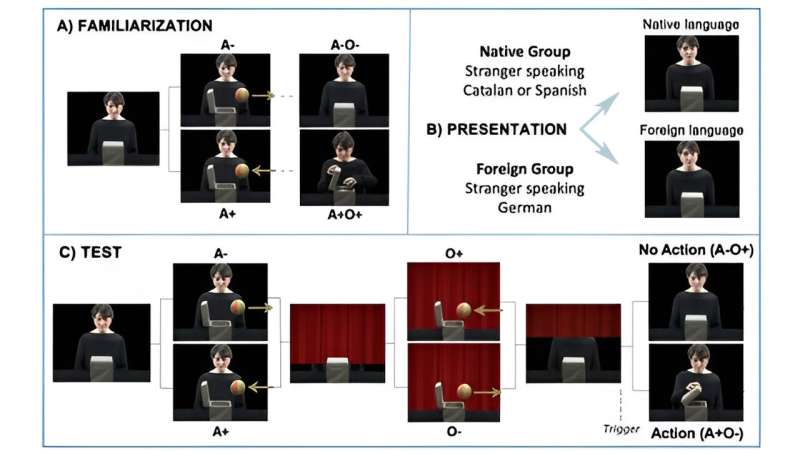This article has been reviewed according to Science X's editorial process and policies. Editors have highlighted the following attributes while ensuring the content's credibility:
fact-checked
peer-reviewed publication
trusted source
proofread
Study: The language spoken by others conditions our ability to predict their actions from a very early age

How do we learn to predict other people's behavior? It is a process that begins during the first months of life and depends on several factors, for example, whether or not we share the same linguistic community. A recent neuroscientific study carried out at UPF examining this cognitive ability in 6-month-old babies has shown that humans predict the behavior of people with the same mother tongue and do not do so if they have heard them speaking a foreign language.
The results of this study were recently published in the article "Selective action prediction in infancy depending on linguistic cues: an EEG and Eyetracker study," in The Journal of Neuroscience.
Núria Sebastián (CBC-UPF) says, "Behavior prediction mechanisms linked to the concept of the 'theory of mind' do not act automatically, but are modulated by social factors."
As principal investigator of the research and director of the Speech Acquisition and Perception research group of the UPF CBC, Sebastián highlights the importance of these results, because they show that behavior prediction mechanisms linked to the concept of the "theory of mind" do not act automatically, but are modulated by social factors.
The research was carried out on a group of 42 6-month-olds. The infants watched videos where they saw a person opening a box to take out a ball in silence. During the study, the subjects underwent an encephalogram, and a neural marker (mu-ERD) was specifically recorded just before the person began to move their arm to open the box.
This marker measures the desynchronization of mu brain waves that takes place when we are about to start a movement or when we think that another person will start to move. The infants' eye movements were also measured to see which parts of the video the children were paying attention to.
The results showed that, at 6 months, infants only showed mu-wave desynchronization when the person featured in the video appeared to be speaking their native language. No desynchronization was observed when they appeared to be speaking in an unknown language: German. This difference would indicate that infants only anticipate someone's behavior when they are from their language community.
Regarding the causes of these differences in predictive ability, the research team believes that they may be related to the strong links between language and culture. In fact, many of the people who share the same mother tongue belong to the same cultural community. Taking into account this close association, which previous studies have already confirmed, the researchers believe that infants can link foreign language speakers with behaviors and attributes that are strange to them.
This would make them less inclined to use their basic knowledge to predict the actions of speakers of foreign languages.
With regard to the consequences of this bias in infants' predictive capacity, the study shows that it can influence children's ability to learn from others and interpret or evaluate reality and the knowledge they acquire about the surrounding environment. Infants mainly tend to imitate and learn from the actions of speakers of their own language because they are more familiar with them.
In short, this study provides important evidence on the interrelationships between two cognitive processes that to date had been conceived separately: the brain mechanisms that support predictive ability and the social categorization systems used by humans to interpret reality (including the language spoken by others).
The brain's predictive mechanisms are related to the so-called mirror neurons, linked to learning by imitation and the capacity for empathy, and evolve flexibly from early childhood to adulthood, conditioned by social factors such as the language of the speakers of each community.
In turn, differences in infants' predictive mechanisms according to the language they speak influence their learning process since they preferentially imitate and acquire new knowledge from the actions of people from their own linguistic community.
More information: Colomer M. et al, Selective action prediction in infancy depending on linguistic cues: an EEG and Eyetracker study, The Journal of Neuroscience (2024). DOI: 10.1523/JNEUROSCI.1301-23.2024




















